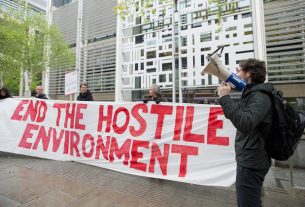Boris Johnson has unveiled his blueprint to get Brexit-Britain “match-fit” for its future, laying out his government’s foreign policy to the very same chamber debating his alarming plans to curb democratic rights with a draconian crack down on protests.
Taking back control it seems, actually means taking fundamental democratic rights from British citizens while sticking two fingers up to the rest of the world as regards the UK’s treaties and obligations.
On Tuesday (March 16), the second day of debate for the second reading of the Police, Crime, Sentencing and Courts Bill was punctuated by Johnson presenting his vision for the UK’s future in the form of the long awaited integrated review into defence – a 100 page document called ‘Global Britain in a Competitive Age’.
It will, Johnson promised, “make Britain stronger, safer and more prosperous” even though the biggest thrust of his ten-year vision to boost trade and deploy soft power around the world is based on the bewildering decision to increase Britain’s nuclear arsenal.
Johnson claimed raising the cap on the UK’s nuclear stockpile will not only deter the traditional threats to Britain’s national security but they will also help it confront potential biological, chemical and may be even cyber assaults in the forthcoming decade.
Because what better response could there be to a group of hackers or the release of a nerve agent in a cathedral city than choosing the nuclear option?
All it takes is one nuclear warhead to trigger a conflict and the end of all life on planet earth – and currently the UK only has a maximum of 180. Clearly the threats the UK will face in the 2020s will require at least another 80 warheads given Johnson told MPs that his government is raising the UK’s cap by 40% to 260 nuclear warheads.
Outrageous decision breaks international law and makes world more dangerous
How could 80 more not inevitably “make Britain stronger, safer and more prosperous” as the prime minister promised in parliament?
Well, it turns out the decision to raise the cap on nuclear warheads from 180 to 260 is not only a complete shift in long term UK policy to reduce its nuclear arsenal, it also breaks a UN treaty that’s regarded as “the cornerstone of the global nuclear non-proliferation regime”.
The decision is in fact nothing less than “outrageous”, said Beatrice Fihn, the executive director of the International Campaign to Abolish Nuclear Weapons (ICAN) – Nobel peace prize winners in 2017.
“It’s irresponsible and actually very dangerous,” Fihn told BBC Radio 4’s World At One. “Not only does it go against international law, law that Britain has signed to pursue nuclear disarmament, it really makes the world more insecure.”
A 40% increase in nuclear warheads is unprecedented. “I don’t think any other country has done that since the height of the cold war,” Fihn said, adding: “It’s a very serious development.”
How can warheads designed for mass murder deal with real threats like climate change?
The weapons are designed for mass murder of civilians and to wipe out cities, “there aren’t even 260 targets to justify that” said Fihn, and besides, nuclear weapons cannot address the real security threats the UK is facing, no matter what the prime minister says or promises.
How can a war head help fix the economic crisis amplified by the pandemic, or deal with climate change never mind the threats from online, virtual and digital sources?
And as for breaking international law, the UK’s gradual reduction down to 180 warheads was part of its compliance to the Nuclear Non-proliferation Treaty. Furthermore, the International Court of Justice has confirmed the UK has a legal obligation to pursue in good faith nuclear disarmament negotiations.
“This goes clearly against that,” said Fihn, who hopes “strong condemnation from around the world” will cause a rethink.
Protest for the right to protest – welcome to Brexit Britain
As Johnson laid out his vision in the Commons, outside protestors were gathering to demonstrate and voice their opposition to the policing bill and its real and present threat to democratic freedoms. Not least, ironically, the very right to protest itself that was brought into sharp focus by the Met police’s behaviour at the vigil for Sarah Everard on Saturday.
For among the swathe of wide sweeping, jaw dropping measures contained in the policing bill are clauses that will empower police to determine who can lawfully protest, where, for how long, and perhaps most worryingly of all, how loud they can be – with up to 10 years in jail if they are deemed to be protesting too noisily.
The law will also ban any protests from around Westminster, inoculating politicians from voters kept at bay by a new blue line enforced by a highly politicised police force.
Alarm bells rang earlier in the pandemic when the home secretary Priti Patel introduced legislation to stop two people protesting – the reason given, “because of Covid” and to curb the spread of the virus.
We were assured these extraordinary measures were for extraordinary times and that they were temporary.
‘Measures that would make a dictator blush’
Well, it transpires that even when Covid restrictions are lifted, the new laws will be even tighter and even more restrictive, with measures taking away freedoms and rights to protest that previous generations fought and died for.
We were warned the government was slowly, bit-by-bit manoeuvring and planning to curtail democratic freedoms and the right to protest and now, brazenly, blatantly and with full confidence from an 80-strong majority and a party purged of (relatively) moderate Tories, they are doing so.
On Tuesday night Conservative MPs backed the bill, voting through its second reading with 358 voting for and 263 opposition MPs from Labour, the Lib Dems, the SNP and Green Party voting against. The DUP abstained even though one of their MPs, Gavin Robinson said the measures contained in the policing bill would “make a dictator blush”.
Patel’s ‘gentle reminder’ about hard copy tactics
Patel told the Commons on Monday (March 15) that one of the main reasons the highly controversial policing bill is so needed is protect “a cornerstone of our democracy and society” – specifically the right to read (a hard copy) of your morning (right wing) newspaper (in a digital age).
Patel told MPs how “last year we saw XR [Extinction Rebellion] blocking the passage of an ambulance on emergency calls, gluing themselves to trains during rush hour, blocking airport runways, preventing hundreds of hardworking people from going to work.
“And finally, I’d like to gently remind the House that on one day last year many people across the country were prevented from reading their morning newspapers due to the tactics of some groups – a clear attempt to limit a free and fair press, a cornerstone of our democracy and society.
“So this bill will give police the powers to take a more pro-active approach in tackling dangerous and disruptive protests”.
The truth is, this is what ‘taking back control’ actually means
On Tuesday, David Lammy, the shadow Lord Chancellor and shadow justice secretary eviscerated the government from the dispatch box, saying: “By giving the police the discretion to use these powers some of the time, it takes away our freedoms ALL of the time.”
In his impassioned speech, the Labour MP for Tottenham added: “The truth… is (the Government) is introducing these measures because it dislikes Black Lives Matter, because it hates Extinction Rebellion, because both tell too many hard truths.”
The truth is that this is very real, this is now, this is Boris Johnson’s Brexit Britain, the one that we were warned about because this is what “taking back control” actually means.
It means one week claiming there is no money to pay nurses and health workers the rise they were promised before the pandemic struck, and then the next week finding billions to spend on nuclear warheads.
If, as George Orwell wrote: “All tyrannies rule through fraud and force, but once the fraud is exposed they must rely exclusively on force”; what next can we expect and what then will we be able to rely upon?




